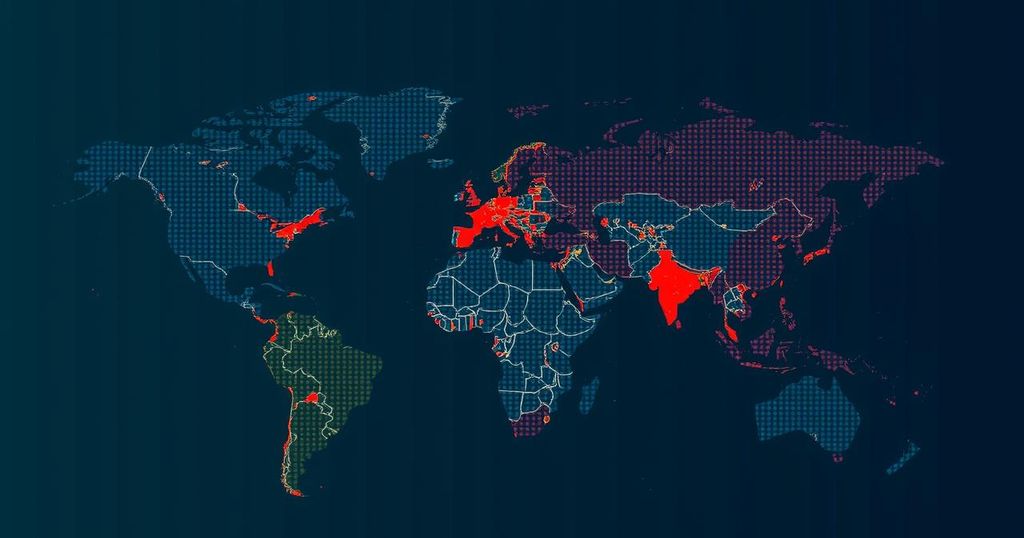Understanding the Global Threats of Today: Insights from FSI Scholars

At a recent panel discussion hosted by Stanford University’s FSI, scholars addressed interconnected global challenges, including climate change, threats to democracy, tensions with China, and conflicts in Ukraine and the Middle East. Key insights include the emergence of a new coalition opposing liberal order, the internal threats to democracy, the resilience of Ukraine against Russia, the continued relevance of China in global affairs, and the importance of climate action despite progress made.
The global landscape is currently confronting a multitude of interlinked challenges, including climate change, declining democratic values, rising tensions with China, ongoing warfare in Europe, and escalating conflicts in the Middle East. Recent discussions hosted by the Freeman Spogli Institute for International Studies (FSI) at Stanford University highlighted five critical areas of concern shared by FSI scholars during the panel titled, “Global Threats Today: What’s At Stake and What We Can Do About It.” Amichai Magen emphasized the emergence of what is referred to as the “axis of misery,” comprising Russia, Iran, and North Korea, with significant support from China. He noted that this coalition aims to dismantle the liberal international order established post-World War II, which has significantly reduced global military expenditures. Magen warned that the potential erosion of this order could lead to increased warfare and instability, particularly concerning nations such as Ukraine, Israel, and Taiwan, which face existential threats. Didi Kuo pointed out that the most significant threats to democracy are now arising from within nations rather than from foreign adversaries. She cited instances where democratically elected leaders undermine democratic processes, fostering an environment where anti-democratic forces flourish. However, she noted positive examples from countries like France, Brazil, and Poland, where coalitions of diverse political ideologies successfully opposed illiberal governance. The ongoing war in Ukraine was addressed by Steven Pifer, who countered narratives suggesting Ukraine’s inevitable defeat. He stressed the substantial losses Russia has incurred and emphasized that Ukraine’s determination to secure its sovereignty remains strong. He called for increased support from allies, underscoring the importance of a stable Ukraine for European security and, consequently, broader U.S. national interests. Oriana Skylar Mastro articulated that, despite discussions of China’s economic slowdown, its geopolitical significance remains undiminished. She urged that U.S.-China relations ought to be understood in terms of global dynamics and called for a more coherent strategy toward the developing world to maintain a balance of power. Finally, Marshall Burke addressed climate change, outlining the progress made in emissions reductions but underscoring the imperative for continued efforts in both mitigation and adaptation to cope with the realities of a warming planet. He emphasized the importance of the Inflation Reduction Act in the U.S., which has fostered advancements in green technologies while still acknowledging the substantial work that lies ahead.
The panel discussion titled “Global Threats Today: What’s At Stake and What We Can Do About It” convened during Stanford University’s 2024 Reunion and Homecoming weekend, featuring insights from scholars at the Freeman Spogli Institute for International Studies. This event was moderated by Michael McFaul, the Institute’s director. The scholars addressed a range of critical global threats, including climate change, democratic backsliding, geopolitical tensions with China, and ongoing conflicts impacting the Middle East and Europe, emphasizing the urgency of multi-faceted approaches to these complex issues.
The discourse presented by the FSI scholars reveals a critical need for awareness and proactive measures to combat the multifaceted threats faced globally. The interplay between domestic and international challenges underscores the importance of strengthening democratic institutions, supporting Ukraine’s resilience, reassessing U.S.-China relations, and continuing climate action. Coordinated efforts will be imperative as the world navigates these pressing issues, with the potential for both progress and peril hanging in the balance.
Original Source: fsi.stanford.edu







